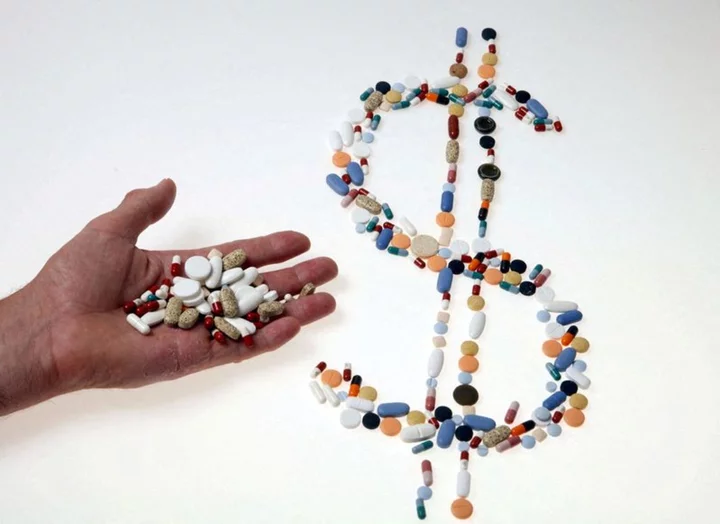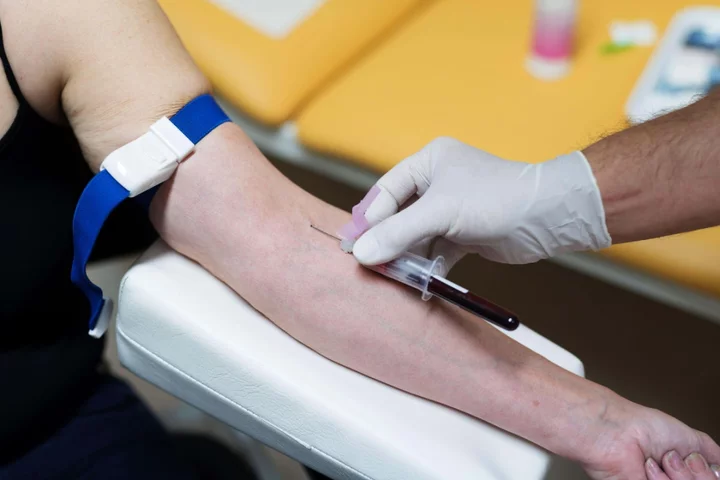
Bank failure: Kansas Heartland Tri-State Bank closed by FDIC
Heartland Tri-State Bank of Elkhart, Kansas, failed on Friday, with the Federal Deposit Insurance Corporation taking control.
2023-07-29 07:57

NBA Rumors: Damian Lillard could get in trouble for “only Miami” stance
The NBA warned Damian Lillard and his agent about his public stance of only wanting to join the Miami Heat, threatening discipline if that talk continues.Damian Lillard wants a trade out of Portland and everyone and their mother knows his desired destination is the Miami Heat.We know that be...
2023-07-29 06:59

Hopes of 'Goldilocks' economy, rate peak buoy US stocks
By David Randall NEW YORK A resilient U.S. economy and expectations of a nearing peak in the Federal
2023-07-29 06:25

US heatwave: Scorching heat strains US air conditioning capacity
Weather experts warn of "dangerously hot conditions" over the weekend for millions of Americans.
2023-07-29 06:21

US FDA approves second over-the-counter opioid overdose reversal drug
The U.S. Food and Drug Administration has approved the prescription-free sale of the second opioid overdose reversal drug,
2023-07-29 05:29

Wind and solar are propping up the Texas power grid amid a brutally long heat wave
As Texas bakes under a sweltering heat dome, the power has stayed on and prices haven't spiked tremendously. Thank wind and solar, energy experts say.
2023-07-29 02:16

Kenya cyber-attack: Why is eCitizen down?
A key government online platform has been down for several days and mobile money services are also affected.
2023-07-28 23:25

Biogen to Buy Reata for $7.3 Billion in Rare-Disease Deal
Biogen Inc. agreed to acquire Reata Pharmaceuticals Inc. for $7.3 billion, including debt, to expand its rare disease
2023-07-28 22:56

The two best exercises for lowering blood pressure, according to study
Exercises such as “wall sits” could be the best form of activity to help people reduce blood pressure, a new study suggests. Other physical activity including cardio, resistance training and HIIT workouts are also good for bringing down resting blood pressure levels, researchers found. But isometric exercises – those that involve engaging muscles without movement, such as wall sits and planks – provide the best results, they said. The study, published in the British Journal of Sports Medicine, saw researchers conduct analysis on previous studies looking at exercise and blood pressure. Some 270 studies were included in the final analysis which contained data on almost 16,000 people. They examined the impact different exercises had on systolic blood pressure, which notes the force at which the heart pumps blood around the body; and diastolic blood pressure, the resistance to the blood flow in the blood vessels between heartbeats when blood is pumped around the heart. The researchers, led by academics at Canterbury Christ Church University in Kent, found that there were significant reductions in resting blood pressure following cardio (aerobic exercise); dynamic resistance training, such as squats, press-ups and weights; high intensity interval training (HIIT); and combined training and HIIT. But the largest reductions were seen after isometric exercise training. A secondary analysis on specific types of exercises found the most benefit was seen among those who performed “isometric wall squats” and among runners. The academics said that current exercise recommendations for the prevention and treatment of high blood pressure are based on “older data” and suggest that it may be time to review the current guidelines. “Aerobic exercise training, dynamic resistance training, combined training, high-intensity interval training and isometric exercise training are all significantly effective in reducing resting systolic and diastolic blood pressure,” they wrote. “Overall, isometric exercise training is the most effective mode in reducing both systolic and diastolic blood pressure. “These findings provide a comprehensive data driven framework to support the development of new exercise guideline recommendations for the prevention and treatment of arterial hypertension.” For the average adult high blood pressure is considered to be from 140/90mmHg. When a person’s blood pressure is too high it puts extra strain on blood vessels, heart and other organs, such as the brain, kidneys and eyes. Persistent high blood pressure can lead to a number of serious health problems including heart attacks, strokes and vascular dementia. While there are medications which can help, people can make a number of life-style changes to help bring their blood pressure down including regular exercise, losing weight, cutting back on caffeine, alcohol and salt. Read More Dating app screenshot culture is out of control Husband fired from family business after wife roleplayed with reborn dolls The bowel cancer symptom George Alagiah wished he’d caught earlier Charity boss speaks out over ‘traumatic’ encounter with royal aide Ukraine war’s heaviest fight rages in east - follow live
2023-07-28 19:51

Drugmakers go under the skin, skirting early US Medicare price negotiations
By Michael Erman NEW YORK Injectable versions of some widely-used cancer drugs including Johnson & Johnson's blockbuster multiple
2023-07-28 18:25

Hepatitis B and C could cause ‘significantly higher cancer risk’ than smoking daily pack of cigarettes
People living with hepatitis B (HBV) and hepatitis C (HCV) could be just as likely or more likely to develop cancer than someone smoking a pack of cigarettes a day, new research suggests. According to the Center for Disease Analysis (CDA) Foundation, people infected with hepatitis B and C viruses “have a similar or significantly higher risk of developing cancer than someone who actively smokes one pack of cigarettes per day”, and therefore HBC and HBC should be “considered as cancer causing infections and international guidelines should be reconsidered accordingly”. Hepatitis is the term used to describe inflammation of the liver, according to the NHS. Hepatitis B is spread in the blood of an infected person – it can be spread from infected women to their babies, or through unprotected sex and injecting drugs – and hepatitis C is usually spread through blood-to-blood contact with an infected person. The NHS says HCV is most commonly spread in the UK through sharing needles used to inject drugs. The foundation found that HBV and HCV viruses are highly oncogenic. Oncogenes are mutated genes which can lead to cancers in multiple organs and sites. Homie Razavi, managing director at CDA Foundation said: “Hepatitis B and C infections are silent epidemics. These viral infections are cancer causing but since infected individuals don’t show any symptoms until it is too late, most infections go unnoticed. “It is important for all of us to recognise the high risk of cancer associated with hepatitis B and C infections and get patients linked to care. Treatment can reduce the risk of cancer by 85% or more.” As part of a call on World Hepatitis Day 2023 (July 28), the World Hepatitis Alliance (WHA) has launched a campaign called ‘We’re not waiting’ with its global network of 323 members in over 100 countries, in order speed up the fight against the disease, which claims a life every 30 seconds. In a new survey, the WHA found that 42% of people around the world are unaware that viral hepatitis is one of the leading causes of liver cancer. Nearly three-quarters (74%) of those surveyed said knowing that hepatitis causes liver cancer means they are more likely to get tested, whilst 82% would get vaccinated. In total, over 350 million people have been diagnosed with either hepatitis B or C around the world, which results in more than 1.1 million deaths every year. And by 2040, deaths caused by this disease could surpass mortality from malaria, HIV, and tuberculosis combined, according to the WHA. “Every year, more than a million lives are lost to hepatitis,” said Danjuma Adda, president of the WHA. “The theme of World Hepatitis Day 2023 is ‘We’re not waiting’. It’s a call to accelerate elimination efforts of viral hepatitis now and the urgent need for testing and treatment for the real people who need it. “Individuals and communities around the world are making change happen in their own lives and in [the] world around them. We celebrate them, while demanding more action. We’re not waiting for change – we’re fighting to make it happen.” Read More Charity boss speaks out over ‘traumatic’ encounter with royal aide Ukraine war’s heaviest fight rages in east - follow live
2023-07-28 17:57

Experts reveal the most unhygienic things in your kitchen – and how to get them clean
It’s likely there are countless things in your kitchen which look clean, but actually, they’re filthy. Could your dishcloths be making you sick? When was the last time you washed your tea towels? And do we really need to bleach the sink more than once a month? We asked an expert to find out. Knobs, door handles, and buttons The buttons and dials on your kitchen appliances could be a germ-fest. “People often neglect to clean these areas of the kitchen,” says Danielle Mason, a cleaning content creator – or ‘cleanfluencer’ – who creates tutorials and videos on TikTok and Instagram. “Most of the time, they don’t think it is important, but as you’re commonly handling raw meat and food, it’s extremely important to keep these areas clean, due to cross-contamination. “Always sanitise with a cloth – I like to do this with Zoflora, as it leaves a great smell afterwards, and kills bacteria from dirty fingers.” Cloths If what you clean with isn’t clean, chances are, your kitchen isn’t either. “I always leave my cloth to soak in bleach before going to bed every night,” says Mason. “This enables a new start in the morning with no bacteria. Also, make sure you’re replacing the cloths – I would suggest a new one every two weeks, whilst still bleaching every night. And make sure you’re not using this cloth on anything other than the kitchen, as you do not want to cross-contaminate.” Sponges Mason stresses sponges are unhygienic, as they’re constantly damp and can carry E. coli. “People tend not to use sponges, as they carry so many more germs, and even putting them in the microwave will not kill all of them. Avoid a sponge where possible.” Dish towels Dish towels and tea towels may not be changed anywhere near often enough. “You should have one for every day of the week, as they carry so many bacteria and germs, which get spread across the kitchen. If you’re drying pots and pans, and then wiping down your surfaces, it’s not good,” she says. Chopping boards Chopping boards – particularly wooden ones – could be a haven for bacteria. “You should have a different colour for different types of food, one for meat, fruit, and other foods,” advises Mason. “The best way to clean them is in a dishwasher, as it’s good to get rid of all the germs due to the very high heat. If you don’t like the dishwasher, then boil the kettle water and leave the chopping boards to soak in it. I use a steam cleaner on mine, as it kills 99.9% bacteria and there are no chemicals.” It is best to avoid wooden chopping boards altogether, as these cleaning methods may damage them. Kitchen sink “This is a massive breeder of bacteria and grime; a distinct microbiome is found in sinks. “The plumbing area found beneath sinks revealed microbial communities dominated by a group of bacteria called Proteobacteria. This phylum includes pathogens such as Salmonella and E. coli, which can cause serious disease,” Mason shares. “I’ve always been taught never to wash my hands in the sink, and to never throw dirty water down the sink. You wash your cups and plates in the sink and prepare food, so it should always be kept clean, and nothing from outside the kitchen should cross-contaminate that. For example, never wash your floors and put dirty water in your kitchen sink, always throw it down the toilet.” How do you possibly clean the inside of your sink and drains? “Baking soda and vinegar is the best way to clean your sink out, or bleach, but you must be careful with bleach, as it can stay in the bottom of your sink, depending on the material it’s made of. I clean my sink out every day.” Pipes and cupboards around your sink could be leading you to have a rodent problem. “You can prevent mice and rodents from entering the kitchen by covering any small crevices or cracks. It is also important to repair leaks as soon as they happen, as they can come through the pipes,” she says. Fridges “Deep clean [your fridge] every two months. A normal cleaning – the wiping of shelves – should be done every other day with soapy water. For any bad smells, use baking soda, which will absorb the smell from the fridge,” Mason continues. “The fridge is a breeding ground for salmonella, E. Coli and other bacteria.” Bins Where you throw your waste away could be a breeding ground for germs. “Make sure you keep [outdoor] rubbish bins away from your house, and make sure you empty your bin as soon as it’s full,” advises Mason. “I personally do not keep a bin in the kitchen, I use a bag and I take that out by the end of the day, but if you are using a bin, make sure you bleach it with hot kettle water, to keep it smelling fresh.” Read More This is why you keep waking up at 4am – and what you can do about it TV chef James Martin reveals cancer diagnosis in apology over ‘bullying’ allegations Bursts of activity that make you huff and puff ‘linked to reduced cancer risk’ Charity boss speaks out over ‘traumatic’ encounter with royal aide Ukraine war’s heaviest fight rages in east - follow live
2023-07-28 17:48
